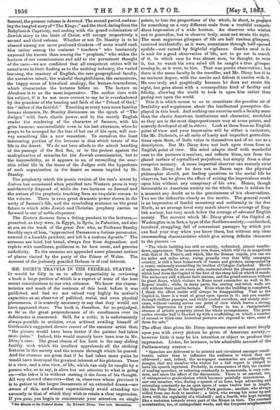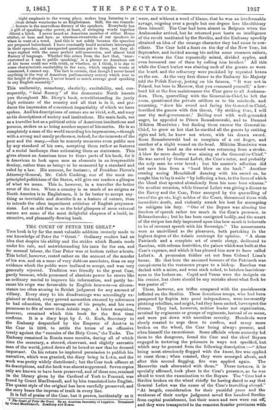MR. DICEY'S TRAVELS IN THE FEDERAL STATES.* IT would be
folly in us to affect impartiality in reviewing a book a large portion of which is a reprint of some of the best recent contributions to our own columns. We knew the charac- teristics and much of the contents of this book before it was published, and had we not valued very highly its author's capacities as an observer of political, social, and even physical phenomena, it is scarcely necessary to say that they would not have appeared there. The book is, therefore, for us prejudged, as far as the great preponderance of its excellences over its deficiencies is concerned. Still, for a critic, it is unfortunately always possible to criticize, even without availing himself of Goldsmith's suggested dernier ressort of the amateur artist that, "the picture would have been better if the painter had taken more pains." Indeed, this would scarcely have been true in Mr. Dicey's case. The great charm of his book is the easy sliding facility with which his intellect apprehends all the striking features in the society and the scenes through which he passed. And the chances are great that if he had taken more pains he would have destroyed the greatest interest of his pictures. There is a view, and a true view, of life, which can only be caught by a person who, so to say, is alive but not attentive to what is going on—who takes it in without making it the focus of his thought. All very shrewd observers—that is, observers whose province it is to gather in the larger lineaments of an extended drama—are aware of this, and almost superstitiously avoid attending too earnestly to that of which they wish to retain a clear impression. If you gaze, you begin to concentrate your attention on single • fisz Months in the Federal &Wm. By Edward May. Two Tobi. Macmillan. points, to lose the proportions of the whole, in short, to prep re for something on a very different scale from a truthful compe dious impression of a wide horizon. An observer who wishes not to generalize, but to observe truly, must not strain his sight. The most sagacious glimpses of life are half random glimpses, received incidentally, as it were, sometimes through half-opened eyelids—not earned by frightful vigilance. Goethe used to lie in wait for a good observation of life, not to go out in search of it, in which case he was almost sure, he thought, to miss it, but to watch his own mind till he caught a true glimpse coming in, as it were, to him. That was poetic observation; but there is the same faculty in the traveller, and Mr. Dicey has it in an eminent degree, with the merits and defects it carries with it. He sees truly and graphically because he does not strain his sight, but goes about with a cosmopolitan kind of facility and felicity, allowing the world to look in upon him rather than gazing out upon the world.
This it is which seems to us to constitute the peculiar air of flexibility and suppleness about the intellectual perception dis- played in this book. And nothing can exercise such a faculty more than the elastic American institutions and character, stretched as they are in the most disproportionate way at some points, and scarcely developed at all in others. Look at them from an English point of view and your impression will be either a caricature, like Mr. Dickens's, or all sorts of hasty and imperfect generaliza- tions upon them, of little value in themselves and of no use as a description. But Mr. Dicey does not look upon them from en English point of view. His mind adapts itself with wonderful ease to the pictures it receives, and reflects them, not from the glazed surface of crystallized prejudices, but simply from a clear receptive memory. A more impartial observer can scarcely exist than Mr. Dicey, for he does not, as Bacon says the physical philosopher should, put leading questions to the social life he observes, but he gives the effect of seizing the impressions made upon him without any conspiracy of his own. Hence, though favourable to American society on the whole, there is seldom for a moment any doubt as to the genuineness of his observations. You see the defecteas clearly as the merits. The general result is an impression of fearful monotony and uniformity in the free North, at an average level very much above the average of Eng- lish society, but very much below the average of educated English society. The account which Mr. Dicay gives of the Capitol at Washington is, in fact, a type of the Northern society,—unfinished, involved, straggling, full of convenient passages by which you can find your way when you know them, but without any clear commanding characteristics which give strong definite character to the picture :— " The whole building has still an untidy, unfinished, almost tumble- down, appearance. The immense iron dome, which will vie in magnitude with that of St. Peter's, and which, like the Roman cupola, you can see for miles and miles away, rising grandly over that hilly campagna country, is still a bare framework of beams and girders, surmounted by a crane, ominously resembling its brother of Cologne Cathedral. Blocks of unhewn marble lie on every side, scattered about the pleasant grounds which lead from the Capitol to the foot of the steep hill on which it stands. The niches are still without their statues, and the grand entrance without its giant doors, which visitors to Rome must remember so well in Mr. Rogers' studio ; while, in many parts, the staring red-brick walls are still without their marble facings. Even when the building is completed, I think the effect inside will always be disappointing. Vast as the Capitol is, there is a want of great open spaces in it; and you wander through endless passages, and richly-roofed corridors, and stately stair- cases, without coming across one point of view which leaves a strong, definite impression on your mind. There is, too, a characteristic absence of artistic propriety about the whole arrangements. The great centre circular hall is blocked up with a scaffolding, on which a number of second or third-rate historical pictures are exposed to view, some of them for sale."
The effect thus given Mr. Dicey impresses more and more deeply upon you with every picture he gives of American society,— however little it may be his intention or object to produce this impression. Listen, for instance, to his admirable account of the Parliamentary orators - " Speeches are delivered to be printed and circulated amongst consti- tuents, rather than to influence the audience to which they are addressed ; and, indeed, the newspaper summaries are ordinarily so meagre, that any member who wishes for a full report is obliged to have his speech reprinted. Probably, in consequence of this, the custom of reading speeches, or referring constantly to memoranda, is very com- mon, and mars the effect of the discussions. There is an amount, too, of unimpressive gesticulation which becomes painfully monotonous. I saw one member, who, during a speech of an hour, kept advancing and retreating constantly up an open space of some twelve feet in length, like the Polar Bear at the Regent's Park gardens ; another, who always sidled from one desk to another ; a third, who swung his arms up and down with the regularity of a windmill ; and a fourth, who kept turning like a teetotum towards every part of the House in turn. The constant accentuation, too, of unimportant words, and the frequent misplacement
right emphasis to the wrong place, makes long listening to an rican debate wearisome to an Englishman. Still, the one remark- feature is the marvellous fluency of the speakers. Everybody has i gift of speaking—the power, at least, of stringing words together iithout a hitch. I never heard an American member of either House stutter, or hem and haw, as nineteen-twentieths of our speakers do when in want of a word. And this is not solely because the speeches are prepared beforehand. I have constantly heard members interrupted in their speeches, and unexpected questions put to them, yet they al- ways replied with the same perfect self-possession, and almost fatal fluency of language. Whether this arises from the fact that, unac- customed as I am to public speaking,' is a phrase no American out of his teens could use with truth, or whether, as I think, it is due to some characteristic excitability in the race, which supplies words at command, I cannot say. The fact is certain, that though I never heard anything in the way of American parliamentary oratory which rose to the height of eloquence, I never heard so much average good speaking in any English assembly."
This uniformity, monotony, elasticity, excitability, and, con- sequently, "fatal fluency" of the democratic North haunts you throughout Mr. Dicey's book, notwithstanding its justly high estimate of the country and all that is in it, and pro- duces the impression of consistent impartiality of which we have spoken. And his descriptions of scenes are as vivid, soft, and easy as his descriptions of society and institutions. His main fault, not as a traveller but as a political critic of American institutions and persons, strikes us as being another aspect of his merits. He is so completely a man of the world recording his impressions,—though with a strong and manly preference, indeed, for the interests of the poor and the many,—that he scarcely measures even public men by any standard of his own, accepting them rather as features of a social landscape than estimating them as statesmen. This gives almost an American tone to these parts of his book, fur it is American to look upon men as elements in an irrepressible destiny, rather than as beings to be measured by a standard and ruled by a law. His account, for instance, of President Pierce's Attorney-General, Mr. Caleb Cushing, one of the most un- principled politicians of the States, will give our readers a glimpse of what we mean. This is, however, in a traveller the better error of the two. When a country is so much of an enigma as North America is to Englishmen, it is far better to accept any- thing as inevitable and describe it as a feature of nature, than to intrude the often impertinent criticism of English preposses- sions. Let us add that to us the brief glimpses of mere external nature are some of the most delightful chapters of a lucid, in- structive, and pleasantly-flowing book.































 Previous page
Previous page